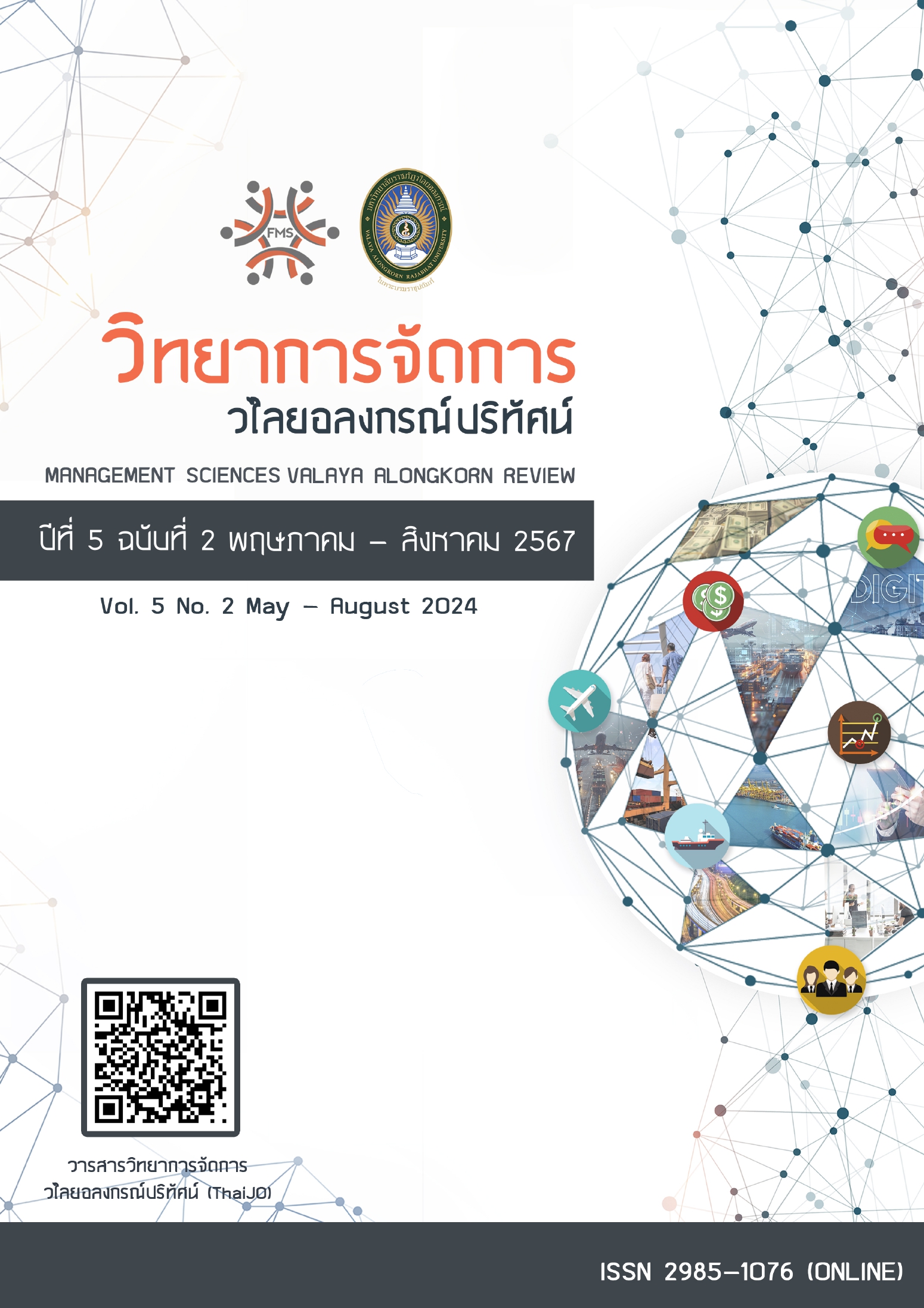ทัศนคติ บรรทัดฐานทางสังคม และการรับรู้สภาพแวดล้อมภายนอกทางธุรกิจ ส่งผลต่อความตั้งใจเป็นผู้ประกอบการธุรกิจสตาร์ทอัพของกลุ่มเจเนอเรชัน ซี ในอำเภอเมือง จังหวัดสงขลา
Main Article Content
บทคัดย่อ
การวิจัยนี้มีวัตถุประสงค์เพื่อศึกษา 1) ระดับทัศนคติ บรรทัดฐานทางสังคม และการรับรู้ถึงสภาพแวดล้อมภายนอก และ 2) ปัจจัยที่ส่งผลต่อความตั้งใจเป็นผู้ประกอบการธุรกิจสตาร์ทอัพ
ของกลุ่มเจเนอเรชัน ซี ในอำเภอเมือง จังหวัดสงขลา โดยกลุ่มตัวอย่างที่ใช้ในการวิจัย คือ ผู้ที่เกิดระหว่างปี พ.ศ. 2541 – 2555 ที่กำลังศึกษาในระดับอุดมศึกษาหรือกำลังทำงานและรู้จักธุรกิจสตาร์ทอัพ จำนวน 400 คน สถิติที่ใช้ในการวิเคราะห์ ประกอบด้วย ค่าความถี่ ค่าร้อยละ ค่าเฉลี่ย ค่าส่วนเบี่ยงเบนมาตรฐาน และสถิติการวิเคราะห์พหุสัมพันธ์เชิงถดถอย Multiple Regression ด้วยวิธี Backward
ผลการศึกษาพบว่า ผู้ตอบแบบสอบถามส่วนใหญ่มีทัศนคติต่อการเป็นผู้ประกอบการระดับปานกลางโดยให้ความสำคัญกับความมีนวัตกรรมเป็นอันดับแรก บรรทัดฐานทางสังคมอยู่ในระดับสูงโดยมีความเห็นว่าบุคคลสำคัญจะเป็นผู้สนับสนุนและให้กำลังใจในการทำธุรกิจ การรับรู้สภาพแวดล้อมภายนอกทางธุรกิจอยู่ในระดับปานกลางซึ่งให้ความสำคัญกับคู่แข่งขันเป็นอันดับแรก และมีความตั้งใจเป็นผู้ประกอบการธุรกิจสตาร์ทอัพระดับปานกลาง โดยมีความพยายามทำธุรกิจเป็นของตนเอง สำหรับปัจจัยที่ส่งผลเชิงบวกต่อความตั้งใจที่จะเป็นผู้ประกอบการธุรกิจสตาร์ทอัพ ได้แก่ ความสนใจในธุรกิจสตาร์ทอัพ บรรทัดฐานสังคม การรับรู้สภาพแวดล้อมภายนอกทางธุรกิจด้านการเมือง เศรษฐกิจ สังคม กฎหมาย และสิ่งแวดล้อม
Article Details

อนุญาตภายใต้เงื่อนไข Creative Commons Attribution-NonCommercial-NoDerivatives 4.0 International License.
บทความ ข้อความ ภาพประกอบ และตารางประกอบที่ลงพิมพ์ในวารสารเป็นความคิดเห็นส่วนตัวของผู้นิพนธ์ ถือเป็นความรับผิดชอบของผู้นิพนธ์แต่เพียงผู้เดียว กองบรรณาธิการไม่จำเป็นต้องเห็นตามและไม่มีส่วนรับผิดชอบใด ๆ
เอกสารอ้างอิง
ณฤทธิ์ วรพงษ์ดี. (2561). Startup คือธุรกิจอะไรกันแน่. สืบค้น 5 กรกฎาคม 2567, จาก https://www.live-platforms.com/education/article/5464.
ณัชพร แสงสุพรรณ. (2565). ความตั้งใจที่จะเป็นผู้ประกอบการด้านธุรกิจเกี่ยวกับผู้สูงวัยของคนเจเนอร์เรชั่น Z ในประเทศไทย. (ปริญญาการจัดการมหาบัณฑิต). กรุงเทพฯ: มหาวิทยาลัยมหิดล.
ธนาคารกรุงศรีอยุธยา จำกัด (มหาชน). (2567). งานดี ลงทุนเด่น ของคน 4 เจนเนอเรชั่น. สืบค้น 5 กรกฎาคม 2567, จาก https://www.krungsri.com/th/plearn-plearn/how-different-generations-invest.
นิรันดร ทัพไชย. (2565). ความตั้งใจในการเป็นผู้ประกอบการของนักศึกษามหาวิทยาลัยในประเทศในภูมิภาคเอเชียตะวันออกเฉียงใต้. วารสารสมาคมนักวิจัย, 27(1), 111-142.
นุชจรี ภักดีจอหอ. (2562). อิทธิพลของทัศนคติและสมรรถนะที่มีต่อความตั้งใจเป็นผู้ประกอบการของนักศึกษา. วารสารการบัญชีและการจัดการ, 15(2), 59 – 75.
บุญชม ศรีสะอาด. (2560). การวิจัยเบื้องต้น. พิมพ์ครั้งที่ 8. กรุงเทพฯ: สุวีริยาสาส์น.
พัทธนันท์ เรืองศรีมั่น. (2562). ปัจจัยที่ส่งผลต่อความตั้งใจที่จะเป็นผู้ประกอบการของนักศึกษาปริญญาโท วิทยาลัยการจัดการ มหาวิทยาลัยมหิดล. (ปริญญาการจัดการมหาบัณฑิต). กรุงเทพฯ: มหาวิทยาลัยมหิดล.
มานิตย์ มัลลวงค์ และวิวัฒน์โชติกร เรืองจันทร์. (2563). ปัจจัยที่มีความสัมพันธ์กับความตั้งใจที่จะเป็นผู้ประกอบการของนักศึกษาคณะบริหารธุรกิจและศิลปศาสตร์ มหาวิทยาลัยเทคโนโลยีราชมงคลล้านนา เชียงใหม่. วารสารวิชาการบัณฑิตวิทยาลัยสวนดุสิต, 17(1), 155 – 173.
มารยาท โยทองยศ และทรงวาด สุขเมืองมา. (2559). ปัจจัยที่มีอิทธิพลต่อความตั้งใจที่จะเป็นผู้ประกอบการของนักศึกษาปริญญาตรี: กรณีศึกษามหาวิทยาลัยกรุงเทพ. สุทธิปริทัศน์, 30(95), 103-115.
รัชนก ปัญญาสุพัฒน์, ชัยวิชญ์ ม่วงหมี และนฤมล สุ่นสวัสดิ์. (2567). รูปแบบความตั้งใจในการเป็นผู้ประกอบการของนักศึกษามหาวิทยาลัยราชภัฏในยุคประเทศไทย 4.0. วารสารวิชาการเครือข่ายบัณฑิตศึกษา มหาวิทยาลัยราชภัฏภาคเหนือ, 14(1), 52-70.
สิริลักษณ์ ทองพูน. (2566). บทบาทการเป็นตัวแปรกำกับของการรับรู้การสนับสนุนจากมหาวิทยาลัยที่มีต่อความสัมพันธ์ระหว่างคุณลักษณะในการเป็นผู้ประกอบการและความตั้งใจเป็นผู้ประกอบการของนักศึกษาระดับปริญญาตรีในภาคใต้. วารสารราชภัฏสุราษฎร์ธานี, 10(2), 211 – 238.
อายุส ยุวรี. (2560). ปัจจัยที่ส่งผลต่อการตัดสินใจเริ่มทำธุรกิจแบบ start-up. (บริหารธุรกิจมหาบัณฑิต). ปทุมธานี: มหาวิทยาลัยธรรมศาสตร์.
Tokla Moeut, ชนม์ณัฐชา กังวานศุภพันธ์ และอุบลวรรณ สุวรรณภูสิทธิ์. (2564). การวิเคราะห์สภาพแวดล้อมภายนอกทางธุรกิจที่ส่งผลต่อความตั้งใจในการเป็นผู้ประกอบการของนักศึกษามหาวิทยาลัยบิวด์ไบรท์ ในประเทศกัมพูชา. วารสารมนุษยศาสตร์และสังคมศาสตร์ มหาวิทยาลัยมหาสารคาม, 40(6), 111-125.
Ahmad, K. S., Rahim, N. A., Samad, K. A., Mohamad, M. S., & Juhari, J. (2022). Factors of Digital Entrepreneurial Intention among Young Generation. International Journal of Academic Research in Business and Social Sciences, 12(10), 1284 – 1295.
Ajzen, I. (1991). The theory of planned behavior. Organizational Behavior and Human Decision Processes, 50(2), 179-211.
Ajzen, I. (2002). Perceived behavioral control, self-efficacy, locus of control, and the theory of planned behavior. Journal of Applied Social Psychology, 32(4), 665-683.
Alexander, I. K., & Honig, B. (2016). Entrepreneurial intentions: A cultural perspective. Africa Journal of Management, 2(3), 235–257.
Aragon-Sanchez, A., Baixauli-Soler, S., & Carrasco-Hernandez, A. J. (2017). A missing link: The behavioral mediators between resources and entrepreneurial intentions. International Journal of Entrepreneurial Behavior & Research, 23(5), 752-768.
Fayolle Alain and Francisco Liñán. (2014). The Future of Research on Entrepreneurial Intentions. Journal of Business Research, 67(5), 663-666.
Hair, J. F. (2014). Multivariate data analysis. New Jersey: Pearson Education Limited.
Hitt, M. A., Ireland, R. D., & Hoskisson, R. E. (2020). Strategic management: Competitiveness & globalization: Concepts and cases (13thedition). United States: Cengage Learning.
Johnson, G., Whittington, R., Scholes, K., Angwin, D., & Regnér, P. (2017). Exploring strategy: Text and cases (11thedition). New Jersey: Pearson.
Kline, R. (2005). Principles and practice of structural equation modeling (2ndedition). United States: Guilford Press.
Kolvereid, L. (1996). Prediction of employment status choice intentions. Entrepreneurship Theory and Practice, 21(1), 47–58.
Linan, F., & Chen, Y. W. (2009). Development and cross-cultural application of a specific instrument to measure entrepreneurial intentions. Entrepreneurship Theory and Practice, 33(3), 593-617.
Mamun, A. A., Nawi, N. B. C., Mohiuddin, M., Shamsudin, S. F. F. B., & Fazal, S. A. (2017). Entrepreneurial intention and startup preparation: A study among business students in Malaysia. Journal of Education for Business, 92(6), 296-314.
Maresch, D., Harms, R., Kailer, N., & Wimmer-Wurm, B. (2016). The impact of entrepreneurship education on the entrepreneurial intention of students in science and engineering versus business studies university programs. Technological Forecasting and Social Change, Vol.104, 172-179.
Peng, H., Li, B., Zhou, C., & Sadowski, B. M. (2021). How does the appeal of environmental values influence sustainable entrepreneurial intention? International Journal of Environmental Research and Public Health, 18(3), 1070.
Shirokova, G., Osiyevskyy, O., Bogatyreva, K., Edelman, L. F., & Manolova, T. S. (2022). Moving from intentions to actions in youth entrepreneurship: An institutional perspective. Entrepreneurship Research Journal, 12(1), 25-69.
Smith-Hunter, A., Joanne, K., & Virginia, Y. (2003). A psychological model of entrepreneurial behavior. Journal of the Academy of Business and Economics, 2(2), 180-192.
Thompson, A. A., Peteraf, M. A., Gamble, J. E., & Strickland III, A. J. (2018). Crafting & executing strategy: The quest for competitive advantage: Concepts and cases (21st edition). New York: McGraw-Hill Education.
Wu, J. (2009). Entrepreneurial orientation, entrepreneurial intent and new venture creation: Test of a framework in a Chinese context (Doctoral dissertation).
Virginia Polytechnic Institute and State University, Virginia. Retrieved from https://vtechworks.lib.vt.edu/server/api/core/bitstreams/d0cc828c-bc9a-4014-8c7a-00e41caa06f2/content.


